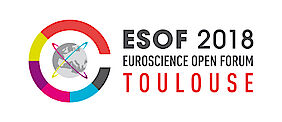News & Academies' activities
EASAC presents its latest findings during ESOF2018 Conference in Toulouse
During the EuroScience Open Forum (ESOF) 2018 (9 – 14 July) EASAC presented two of its latest publications during public sessions to the audience:
- Homeopathic products and practices
- Opportunities and Challenges for Research on Food and Nutrition Security and Agriculture in Europe
"Homeopathic products and practices"
EASAC presented its 2017 statement ‘Homeopathic products and practices: Assessing the evidence and ensuring consistency in regulating medical claims in the EU’ at the EuroScience Open Forum (ESOF) 2018 (9 – 14 July) in Toulouse, France, to explore how the statement has been received by the EU, governments, industry and consumers; how European academies are engaging the public on this issue; and the impact on policy inconsistencies that continue to fuel this industry.
With an estimated market for homeopathic products in the EU at over 1 billion Euro, accounting for around 7% of the total EU market for non-prescription medicine, it may surprise many consumers to know that there is no scientific proof that homeopathy actually works. Yet the proportion of the population using it ranges from 1% to 13% across Europe and the market for homeopathic products is growing annually by 6%. EASAC published this statement to reiterate and reinforce extensive, rigorous evidence that the therapeutic effect of homeopathic preparations, as perceived by the patient, is due to the placebo effect. The objectives in producing this report were twofold: (i) to appeal to policy makers in the EU to take a more explicitly evidence-based approach to assessing the claims for homeopathy and (ii) to stimulate better public engagement to improve consumer’s rights to correct information, whilst respecting consumer choice. It is hoped that this work will help ensure appropriately informed patient choice and effect a standardised, knowledge-based, robust regulatory framework, supported by honest advertising practices across the EU, that is applied equitably to all medicinal products.
The session was moderated by Dame Anne Glover and included an introduction to the background, conclusions, and recommendations of the statement by EASAC Biosciences Programme Director Dr Robin Fears, a report on the regulation and usage of homeopathic products in Sweden by Professor Dan Larhammar, Professor of Molecular Cell Biology at Uppsala University and President of the Royal Swedish Academy of Sciences, a presentation of the status of homeopathy and the report’s widespread and strong impact on public media and society in Hungary by Dr Beata Sperlagh, Institute of Experimental Medicine, Hungarian Academy of Sciences, and a summary of the response of Dutch media and institutions by Professor Jos van der Meer, Emeritus professor of Medicine at Radboud University Nijmegen. The presentations were followed by a lively discussion with the audience.
Points emphasised in this discussion were:
- Is some of the popularity of homeopathy related to disillusion with conventional medical practices, such as very short doctor-patient consultation times? How can conventional medicine act to improve doctor-patient relationships given the pressure on health resources?
- How do different countries vary in their public health system reimbursement of homeopathy - and what changes are occurring (e.g. UK and France)?
- Part of the difficulty in progressing evidence-based public dialogue may be related to the variety of different approaches and practices encompassed within the wide term homeopathy. The scientific community must continue its commitment to exploring and explaining the nature of the evidence base in public engagement.
- What more should the scientific community do to get politicians to realise the implausibility of the evidence for homeopathy? It was emphasised that politicians respond to citizens, reinforcing the importance of engaging with the public about evidence-based healthcare.
"Opportunities and Challenges for Research on Food and Nutrition Security and Agriculture in Europe"
EASAC presented its 2017 report ‘Opportunities and Challenges for Research on Food and Nutrition Security and Agriculture in Europe’ at the EuroScience Open Forum (ESOF) 2018 (9 – 14 July) in Toulouse, France, to discuss lessons learned from this innovative project, focusing on the EU dimensions of the work being delivered by EASAC, key findings for the region and their implications in the global context.
A global growing population is producing many complex global issues. More people are moving to live in cities that are expanding to encroach on arable land. Urban populations, industry and agriculture are competing for available water supplies. Climate change threatens to affect food production and supply chains, further exacerbating malnutrition. How do we ensure that all people, everywhere, have access to an adequate diet that fulfils all their nutrition requirements, while promoting sustainable agriculture and minimising impacts on the environment? These challenging questions require fresh engagement by science to tackle the complexity and interdependencies of competing pressures on our food systems. The InterAcademy Partnership (IAP) has initiated a major project on Food and Nutrition Security and Agriculture (FNSA), which engages regional academy networks in Africa, Asia, the Americas and Europe in identifying scientific opportunities, and in exploring how to use these opportunities to support a more holistic approach to managing food systems, thus making critical contributions to the Sustainable Development Goals.
The session included an introduction to the InterAcademy Partnership by Professor Volker ter Meulen, President of IAP, an introduction to the EASAC project on FNSA in Europe by EASAC Biosciences Programme Director Dr Robin Fears, a presentation of the key findings of the EASAC-IAP project by Dr Claudia Canales, Cambridge Malaysian Education and Development Trust, a talk on the linkages between sustainable diets, nutrition, and health and associated opportunities for research and innovation by Dr Aifric O’Sullivan, University College Dublin, and an analysis of the challenges posed by existing food systems and their international implications by Professor Tim Benton, Professor of Population Ecology at University of Leeds and Distinguished Visiting Fellow at the Royal Institute of International Affairs, Chatham House. The presentations were followed by a lively discussion with the audience.
In the general discussion there was considerable interest expressed in the global implications of points raised in the European work. It was emphasised that there are global opportunities to generate and use science to tackle the shared societal priorities e.g. for "climate-smartness". Further analysis and discussion will be provided in the IAP project's fifth, and global, report, which will be published later in 2018.
Among other points raised in discussion were:
- Implications of biofuel production on agriculture and opportunities for next generation biofuels that may not necessarily compete for land with food production.
- How to address issues for livestock farming contribution to GHG production and climate change, while also increasing options for healthy diets - what are the opportunities for novel food sources, e.g. cultured meat?
- What are the issues for pollinator health? These have been covered in detail in another recent EASAC report.
- What are the prospects for new types of farming, e.g. urban agriculture?
- What needs to be taken into account in developing policy to design food systems' solutions for food and nutrition security? For example, how to stimulate political leadership and inform commercial sector strategies?

































